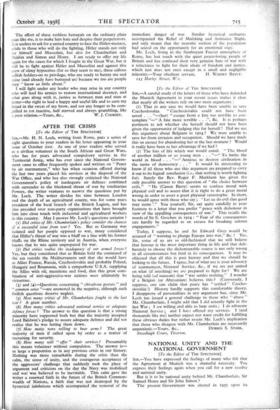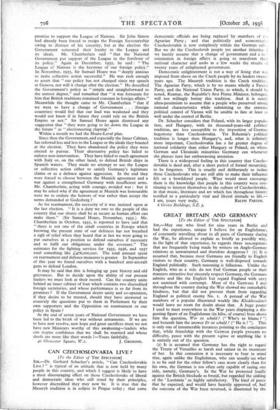NATIONAL UNITY AND THE NATIONAL GOVERNMENT [To the Editor of
THE SPECTATOR] SIR,—You have expressed the feelings of many who felt that the Agreement at Munich was a shameful necessity. You express their feelings again when' you call for a new resolve and national unity.
But is 'it to be national unity behind Mr. Chamberlain, Sir Samuel Hoare and Sir John Simon ?
The present Government was elected in 1935 upon its
promise to support the League of Nations. Sir John Simon had already been forced to resign the Foreign Secretaryship owing to distrust of his sincerity,' but at the election the Government reiterated their loyalty to the League and its ideals. Mr. Chamberlain said " that the National Government put support of the League 'in the forefront of its policy." Again in December, 1935, he said : " The League of Nations is the keystone of our foreign policy."
In November, 1935, Sir Samuel Hoare was " deeply anxious to make collective action successful." He was rash enough to assert that " our policy has not changed since my speech at Geneva, nor will it change after the election." He described the Government's policy as " simple and straightforward to the utmost degree," and remarked that " it was fortunate for him that British traditions remained constant in foreign affairs."
Meanwhile the thought came to Mr. Chamberlain " that if we were to have a change of Government . . . (foreign countries) would feel that our lead was weakened and they would- not know, if in future they could rely on the British Empire or not." Sir Samuel Hoare again dismissed any suggestion that " they were going to let down the League in the future " as " electioneering claptrap."
Within a month we had the Hoare-Laval plan.
Since then the Government, and especially the Inner Cabinet, has referred less and less to the League or the ideals they boasted at the election. They have abandoned the policy they were elected to pursue. Their alternative policy has failed to enforce non-intervention. They have failed to reach agreement with Italy or, on the other hand, to defend British ships in Spanish waters. They made no attempt to use the League or collective action either to satisfy Germany's legitimate claims or as a defence against aggression. In the end they were forced to choose between the Munich agreement and a war against a strengthened Germany with insufficient arms.
Mr. Chamberlain, acting with courage, avoided war : but it may be asked why if the agreement at Munich was honourable were we to endure the horrors of war rather than accept the terms demanded at Godesberg ?
As for rearmament, the necessity of it was insisted upon at the last election. " It is a duty we owe to the people of this country that our shores shall be as secure as human effort can
make them." (Sir Samuel Hoare, November, 1935•) Mr• Chamberlain in October, 1935, is reported to have said that
" there is not one of the small countries in Europe which knowing the present state of our defences has not breathed a sigh of relief when they heard that at last we were going to put ourselves in a position to defend ourselves if necessary and to fulfil our obligations under the covenant." The estimates for the fighting services for 1935, 1936, and 1937 total something like £476,000,000. The total amount spent on rearmament and defence measures is greater. In September of this year we found ourselves with a hundred anti-aircraft guns to defend London.
It may be said that this is bringing up past history and old grievances. But to decide upon the ability of our present leaders we must look at their record. Can the country unite behind an inner cabinet of four which contains two discredited foreign secretaries, and whose performance is so far from its promises ? If the Government desire unity and co-operation, if they desire to be trusted, should they have answered so evasively the questions put to them in Parliemant by their own supporters and the Opposition on rearmament or our policy in Spain ?
At the end of seven years of National Government we have been led to the brink of war without armaments. If we are to have new resolve, new hope and great sacrifices must we not have new Ministers worthy of this awakening—leaders who can inspire confidence that we shall be rearmed and whose deeds are more like 'their words ?—Yours faithfully,

























































 Previous page
Previous page